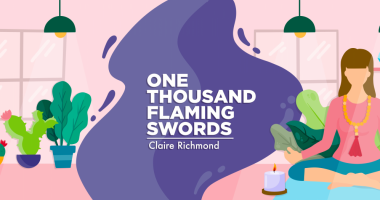Befriending My Inner Soother and Unlearning Pain Normalization

I opened my eyes after a long midday nap. Above my head, the off-white ceiling tiles of my hospital room were textured squares. I traced patterns with my eyes, linking diagonals on an imaginary tic-tac-toe game.
Sleep was my weapon of last resort against a relentless migraine that had me hunched over the toilet all morning, clutching paper towels in one hand, tears squeezing out the corners of my eyes.
While hospitalized for a porphyria attack, as I was last week, I’m often plagued with migraines and vomiting.
As two weeks’ worth of intense abdominal pain had progressed down my back and legs, I wasn’t about to risk waiting to see what happened next on my own. I’ve put off seeking medical intervention before, and I wasn’t ready to play that game again.
It’s knocked out entire sections of my month, days and weeks lost to the pit of porphyria pain. When I’m down there, receiving outpatient treatments and managing at home, I can never get enough traction to crawl out.
This time, I was making the rules. As I began slipping down the hole, I reached out to my hematology team. With direct admit orders, I bypassed the emergency room and found myself, hours later, in a hospital bed.
‘It’s not that bad’
I hope I never get over the surreal feeling of showing up at the inpatient unit when my bed is available. With a pillow under one arm and a bag slung over my shoulder, I could just as easily be checking into a lakeside hotel for a weeklong getaway.
It’s at this point when the doubt trickles in. Should I really be here? Couldn’t I have managed outpatient a bit longer? Am I just being dramatic?
I have a well-established pattern of normalizing my symptoms. My habit is to smile through the pain, to conveniently forget how challenging things have been for my body. Over decades, untreated attacks led to chronic symptoms. However, the severity of my daily affliction built up gradually. I normalized my pain.
I lost count of the doctors who doubted me or wrote me off as a mentally disturbed woman. I minimized my symptoms in order to survive.
When a 19-year search for answers yielded an acute hepatic porphyria diagnosis, my shame and fear were replaced with confusion. What do I expect? How will treatments benefit my life? When do I ask for help?
That last one still perplexes me.
Fortunately, the looks of concern on the faces of my medical team assured me I was in the right place. Where I’m at right now in my rare disease journey, outside validation is helpful. But I inherently know that requesting admission when I did saved me undue hardships and prolonged disease progression.
Kicking the habit
In my head lives this critical drill sergeant of an inner voice. She feeds on perfectionism and doing. No matter what I’m able to achieve, it’s never enough. She thinks she’s helping, but she’s harsh. The self-judgment really kicks in when I let her be my dominant voice.
Thankfully, she’s learned to take a back seat when I’m in the hospital. I cringe at recalling how much time I used to spend on my computer, checking emails and maintaining appearance, even while hospitalized. For so long, I equated my self-worth with what I produced.
Looking out into the budding shrubs of the courtyard, I found another inner voice emerging. She was a wise and motherly sage. She reminds me of Lily Tomlin in “Grace and Frankie,” adorned with draping fabric, a mala swinging from her neck. In a strange way, it seems fitting for my soothing inner voice to be in her 70s.
She gently reminds me that normalizing is a coping mechanism I adopted during a scary and out-of-control time. It saved me heartache and ridicule. It feels kind when I consider the reasons I began minimizing my symptoms to begin with.
Requesting hospital admission after two weeks of extreme pain sounds like a smart idea now that I am further removed from it. In the moment, however, my trauma history and inner drill sergeant were screaming at me to avoid medical intervention. By seeking hospital care, I disrupted my pattern.
Our brains create habitual thoughts and behaviors due to trauma in order to survive. But with time, self-compassion, and the help of our inner soother, we can unlearn them.
***
Note: Porphyria News is strictly a news and information website about the disease. It does not provide medical advice, diagnosis, or treatment. This content is not intended to be a substitute for professional medical advice, diagnosis, or treatment. Always seek the advice of your physician or other qualified health provider with any questions you may have regarding a medical condition. Never disregard professional medical advice or delay in seeking it because of something you have read on this website. The opinions expressed in this column are not those of Porphyria News or its parent company, BioNews, and are intended to spark discussion about issues pertaining to porphyria.







Comments